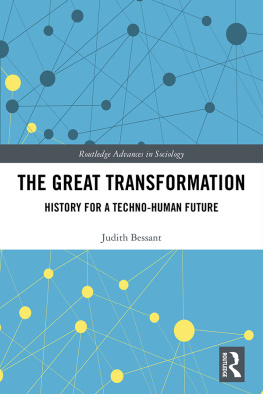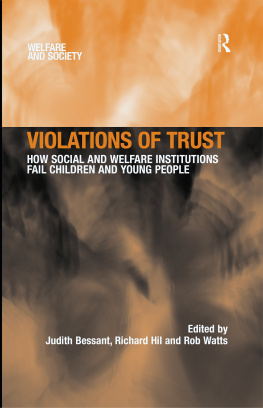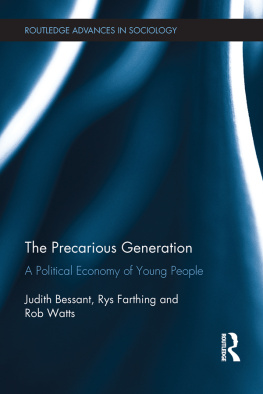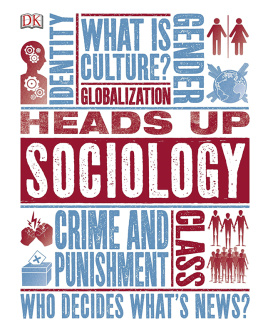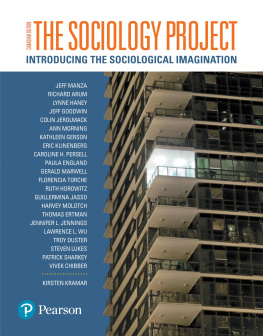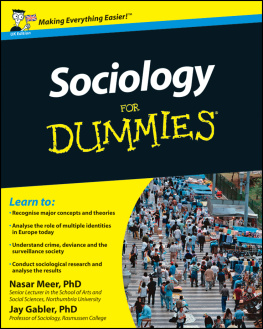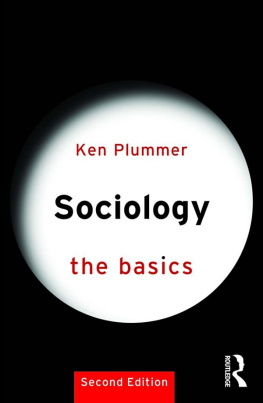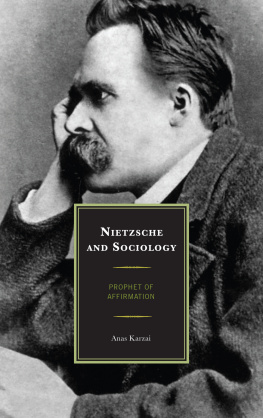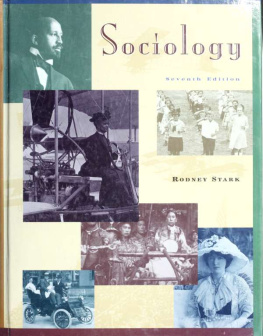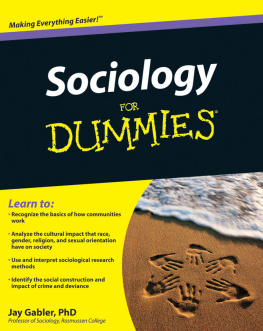SOCIOLOGY AUSTRALIA
THIRD EDITION
Judith Bessant & Rob Watts
First published 2007 by Allen & Unwin
Published 2020 by Routledge
2 Park Square, Milton Park, Abingdon, Oxon OX14 4RN
605 Third Avenue, New York, NY 10017
Routledge is an imprint of the Taylor & Francis Group, an informa business
Copyright Judith Bessant and Rob Watts 2007
All rights reserved. No part of this book may be reprinted or reproduced or utilised in any form or by any electronic, mechanical, or other means, now known or hereafter invented, including photocopying and recording, or in any information storage or retrieval system, without permission in writing from the publishers.
Notice:
Product or corporate names may be trademarks or registered trademarks, and are used only for identification and explanation without intent to infringe.
National Library of Australia
Cataloguing-in-Publication entry:
Bessant, Judith.
Sociology Australia.
3rd ed.
Bibliography.
Includes index.
1. Sociology Australia. 2. Social change Australia. 3.
Australia Social conditions 21st century. 4.
Australia Social policy. I. Watts, Rob. II. Title.
301.0994
Set in 10/14 pt ITC Galliard by Midland Typesetters, Australia
Text design by Lisa White
Photo credits: Pedro Almeida, Matthew John and Sharyn Finger
ISBN-13: 9781741750164 (pbk)
CONTENTS
PART ONE: WHAT IS SOCIOLOGY?
Sociology in an age of insecurity
Reading sociology
Making sense of sociology
Doing sociology
Ethics and sociology
PART TWO: IDENTITY: BEING YOURSELF, BEING AUSTRALIAN
Ourselves: Myself, yourself
Ourselves in families
Being young: Age and identity
Sex in Australia
Religion in Australia
Identity, multiculturalism and imagined community
PART THREE: GLOBALISATION, AUSTRALIA AND SOCIAL CHANGE
Australians at work
Confronting class and inequality
Inequality in Australia
Education in a period of crisis
Health and illness in an unequal society
Crime, deviance and power
Knowing the worldThe Australian media
Sustainability
Conclusion: Australia and globalisation
Glossary
- Title Page
- Part One: What is Sociology?
- 1 Sociology in an age of insecurity
- 2 Reading sociology
- 3 Making sense of sociology
- 4 Doing sociology
- 5 Ethics and sociology
- Part Two: Identity: Being Yourself, Being Australian
- 6 Ourselves: Myself, yourself
- 7 Ourselves in families
- 8 Being young: Age and identity
- 9 Sex in Australia
- 10 Religion in Australia
- 11 Identity, multiculturalism and imagined community
- Part Three: Globalisation, Australia and Social Change
- 12 Australians at work
- 13 Confronting class and inequality
- 14 Inequality in Australia
- 15 Education in a period of crisis
- 16 Health and illness in an unequal society
- 17 Crime, deviance and power
- 18 Knowing the worldThe Australian media
- 19 Sustainability
- 20 Conclusion: Australia and globalisation
- Glossary
There are many people without whom this edition of the book could not have been written. First and always, there are our studentspast and present. We express our gratitude to those students we have taught through the 1990s and into the 2000s. We have relied upon them throughout the years to test many of the ideas and formulations found in the earlier editions of this book. Most willingly expressed their views after being asked to read and to use the book. This advice has helped us to rethink and rewrite this edition.
We want to thank postgraduate students and colleagues like Nick Halfpenny, who initiated the basic research involved in updating the tables; Hariz Halilovic, who worked on the second edition; and Janet Jukes, who updated and added to that work for this latest edition. We would also like to thank Pete Varitimidis for the technical and practical support he provided, as well as his extremely positive attitude. Without their work, our task would have been very much more difficult.
Colleagues like Martin Mowbray, Amanda Watkinson, Kerry Montero, Lois Bryson, Helen Marshall and Desmond McDonnell have helped in all sorts of ways, large and small. We also thank friends and family within and outside our own universities. Their support may not have always been directly related to this project, but without it the book would not have come to be, so thanks to both Sandy Cook and Bob Bessant. Thanks also to Dorothy and Bill Watts, who supplied their son with many cups of tea as he typed awayagainat Ocean Grove over the years. Our families have put up with the absences, distractedness and sometimes bad tempers which writing and then rewriting a book entails. To be the child of an academic must often be difficult. Rebekah and Macgregor, your mother is appreciative.
While the contemporary university is no longer as able to support intellectual work as it once did, many of our colleagues have given us material to read, together with helpful feedback and the type of stimulation with which universities have traditionally been credited. Special thanks to teachers like Sharon Andrews, Julia Thornton, Gillian Cavanagh, Cathryn Kriewaldt and Lisa Harris, who are working out what good teaching and learning look like in the social sciences. The School of Global Studies, Social Science and Planning at RMIT also provided a small amount of research funding to help with revising the data.
Elizabeth Weiss from Allen & Unwin has been her usual encouraging, cheerful, persistent and perceptive self. We are also grateful to the production team at Allen & Unwin, and particularly to Lauren Finger and Susan Jarvis for their expertise in editing and publishing this book.
the heedless recklessness or hopeless confusion or complacent repetition of truths which have become trivial and emptyseems to me among the outstanding characteristics of our time. What I propose, therefore, is very simple: it is nothing more than to think what we are doing.
Hannah Arendt (1958: 5)
Many ordinary Australians today seem to be worried, anxious or upset about how they live. If public opinion polls are to be believed, we no longer see the world as a safe place, and we feel the need to defend ourselves from terrorists intent on destroying the Australian way of life or attacking the West. Many Australians appear to accept that they are engaged in a war against terror waged by radical or fundamentalist Muslims that began with the 9/11 attacks on New York and Washington in 2001. Australia joined with the United States and Britain in a Coalition of the Willing, first in an invasion of Afghanistan in 2002 and then an attack on Iraq in March 2004apparently to prevent Iraq using its arsenal of weapons of mass destruction against the West. In August 2005, an AC Nielsen poll showed that 70 per cent of Australians expected a terrorist attack in Australia in the next few years. Foxtel TV news polls in August 2005 suggested that more than 90 per cent of Australians were prepared to relinquish most of their civil liberties to have stronger security laws. In January 2006, one news poll found 87 per cent of those surveyed were fearful about terrorism.


